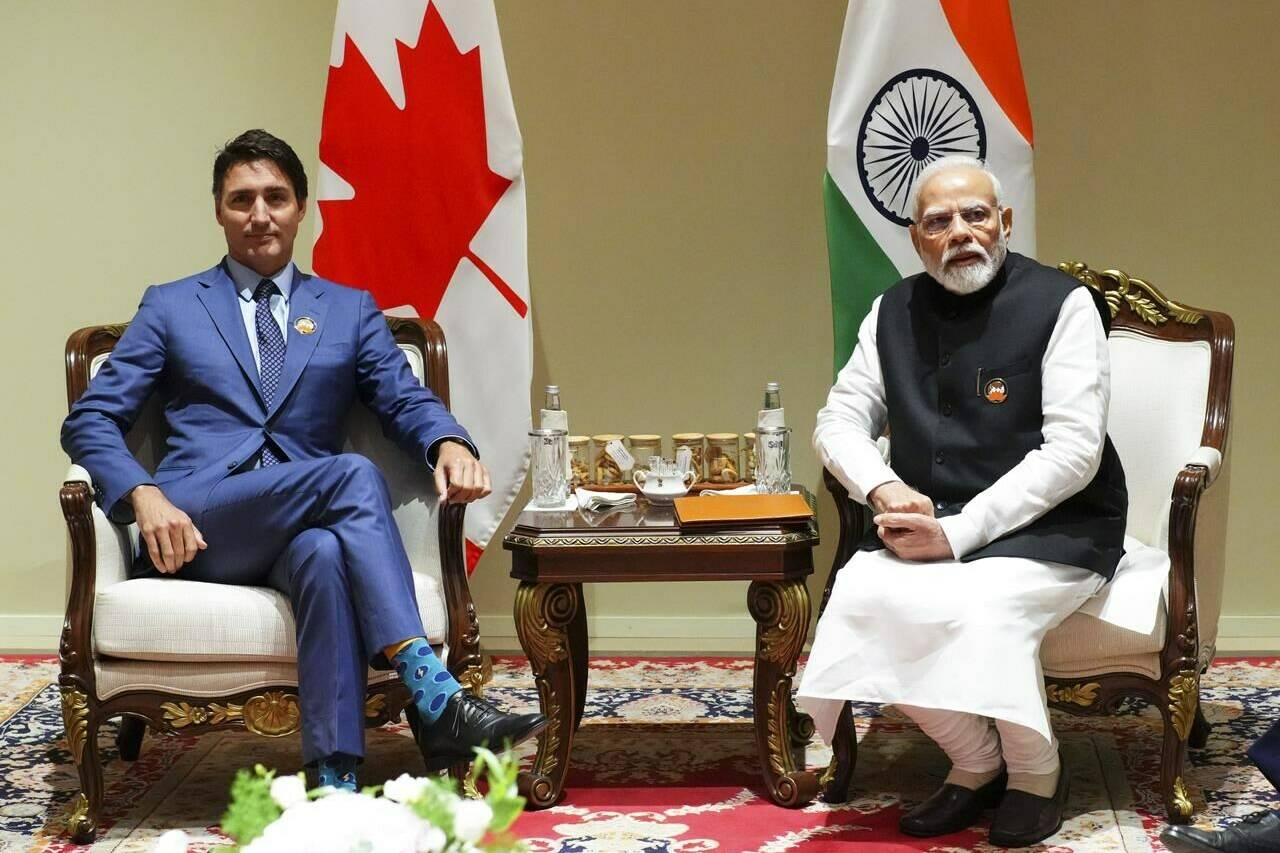Indian Prime Minister Narendra Modi has expressed “strong concerns” over Canada’s handling of the Punjabi independence movement among the overseas diaspora, on the same day thousands in Metro Vancouver’s Sikh community gathered to vote on the matter.
A statement released by India’s Ministry of External Affairs said Modi told Canadian Prime Minister Justin Trudeau on the sidelines of this weekend’s G20 summit in New Delhi that progress in the two countries’ relationship required “mutual respect and trust.”
“India-Canada relations are anchored in shared democratic values, respect for rule of law and strong people-to-people ties,” the Indian government statement said. “(Modi) conveyed our strong concerns about continuing anti-India activities of extremist elements in Canada.”
The statement described the Sikh movement as “promoting secessionism and inciting violence” against Indian diplomats. It called on Canada to work with India on what New Delhi said is a threat to the Canadian Indian diaspora.
The meeting between Modi and Trudeau coincided with voting in British Columbia on a non-binding referendum for a Sikh homeland that supporters call Khalistan.
Large crowds of voters lined up to vote at Surrey’s Guru Nanak Gurdwara on Sunday, after the Surrey School District cancelled organizers’ original plans to rent a local high school for the vote, which is part of an international campaign.
Gurpatwant Singh Pannun, general counsel for the referendum’s organizers, said Monday the attendance numbers were so large that “thousands” were not able to vote, and a second phase of voting is now scheduled for Oct. 29.
Pannun said the turnout is a “clear message” that activists are committed to a “peaceful and democratic” process for the group’s goal of seeking Punjabi independence from India.
“Thousands and thousands (of) Sikhs got together (at) 7 o’clock in the morning and peacefully dispersed after the voting,” Pannun said. “That should be a clear signal even to the Canadians that we follow the laws of the land, and Khalistan is a peaceful and democratic movement — and the Indigenous people of the Punjab should have the right to do an official referendum.”
Organizers have held votes in the Vancouver and Toronto areas, and are preparing for additional referendums in Calgary, Edmonton and Montreal, as well as other parts of Canada, the United States and other countries, Pannun said.
The goal, he said, is to gather all overseas votes by 2025 and present the case to the United Nations for an official referendum on Punjabi independence from India.
Tensions around Sikh independence movements and Canada-India ties escalated in June after Guru Nanak Gurdwara president Hardeep Singh Nijjar was shot dead while in his vehicle at the temple’s parking lot.
Activists organized a protest later that month outside the Indian consulate general’s office in Vancouver, accusing the country of “foreign interference” for possible links to the death.
Police say Nijjar’s death has not been connected to foreign interference, and there’s no reason to believe Canada’s Sikh community is at risk.
However, some activists have called on supporters in Canada to “besiege” India’s diplomatic missions, offering cash rewards for the home addresses of its diplomats.
India’s High Commissioner in Ottawa, Sanjay Kumar Verma, recently said the concern from Indian diplomats about their safety has been “well understood” by Canada in its response to a request for better protection.
“There have been posters where I am called an assassin,” Verma told The Canadian Press.
“If a reward is put on my head, doesn’t it restrict my movement? So, where is my freedom to move freely in this country?”
Verma said, however, that Canada is adequately protecting his country’s diplomats, and closer ties are possible despite heated diaspora politics.
Canada and India last month paused ongoing talks for a bilateral trade deal, and negotiations have been on and off since 2010.
The Indian government’s statement about Modi’s meeting with Trudeau said it believes the Punjabi independence movement is involved in “damaging diplomatic premises and threatening the Indian community in Canada and their places of worship.”
“The nexus of such forces with organized crime, drug syndicates and human trafficking should be a concern for Canada as well,” Modi reportedly told Trudeau, the statement said.
Sikh vote organizers say they have been unfairly portrayed by India, saying their referendum poster — showing a pen stabbing a gun representing the Indian government — is a pro-peace, pro-democracy image showing the group’s commitment to voting and non-violent actions.
The same poster was one of the key reasons cited by the Surrey School District in its decision to cancel vote organizers’ planned rental of a school for the vote.
In a statement, the school district said it cancelled the rental of Tamanawis Secondary a week before the event because promotional posters featured images of a weapon alongside the school building.
The district says its decision is neither an endorsement nor a criticism of the movement and refunds will be issued, but organizers said they intend to pursue legal action for what they call a “breach of contract” and a violation of Charter rights on freedom of expression.
READ ALSO: Forces to the rescue after plane breakdown strands Trudeau in India
READ ALSO: India or Bharat? A nation ponders a change in its national identity

